Despite recent tragic events the people of Northern Ireland have
Page 38
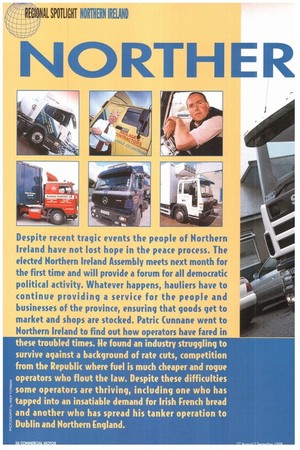
Page 39
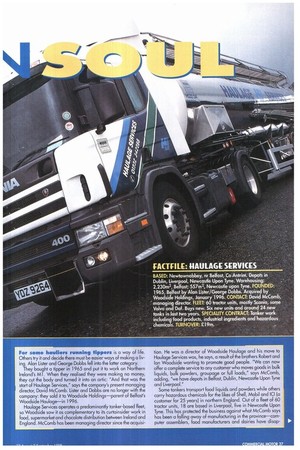
Page 40
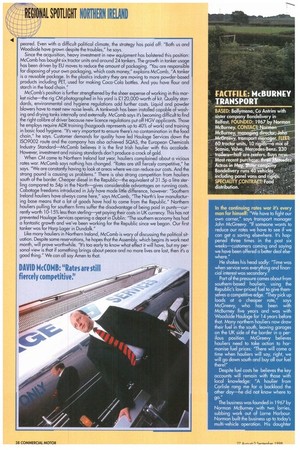
Page 41
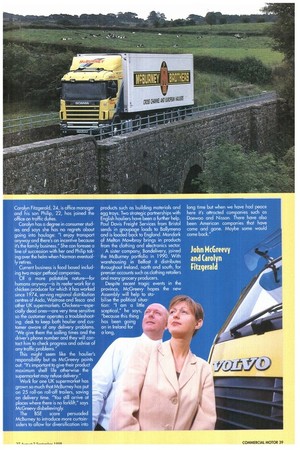
Page 43
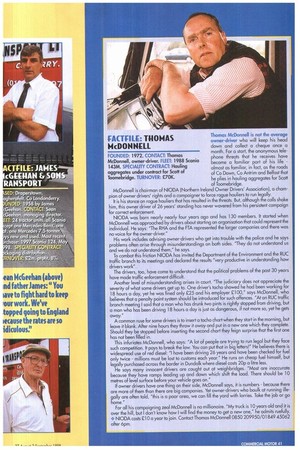
Page 42
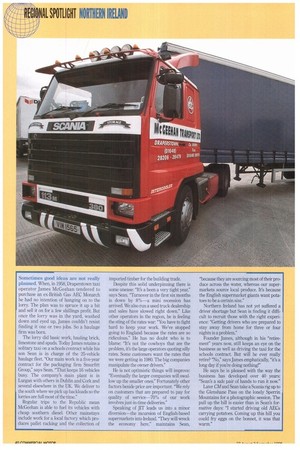
Page 44
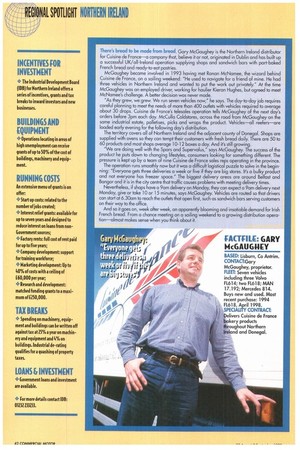
Page 45
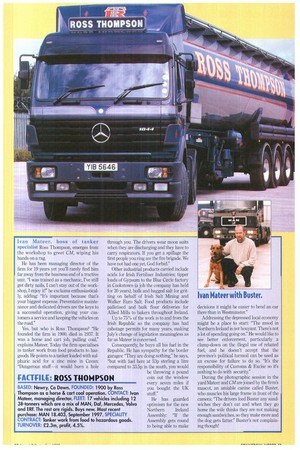
If you've noticed an error in this article please click here to report it so we can fix it.
not lost hope in the peace process. The elected Northern Ireland Assembly meets next month for the first time and will provide a forum for all democratic political activity. Whatever happens, hauliers have to continue providing a service for the people and businesses of the province, ensuring that goods get to market and shops are stocked. Patric Cunnane went to Northern Ireland to find out how operators have fared in these troubled times. He found an industry struggling to survive against a background of rate cuts, competition from the Republic where fuel is much cheaper and rogue operators who flout the law. Despite these difficulties (1! some operators are thriving, including one who has -I' tapped into an insatiable demand for Irish French bread and another who has spread his tanker operation to P2 Dublin and Northern England. FACTFILE: HAULAGE SERVICES BASED: Newtownabbey, nr Belfast, Co Antrim. Depots in Dublin, Liverpool, Newcastle Upon Tyne. Warehousing: 2,230m2, Belfast; 557m2, Newcastle upon Tyne. FOUNDED: 1965, Belfast by Alan Lister/George Dobbs. Acquired by Woodside Holdings, January 1996. CONTACT: David McComb, managing director. FLEET: 60 tractor units, mostly Scania, some Volvo and Daf. Buys new. Six new units and around 24 new tanks in last two years. SPECIALITY CONTRACT: Tanker work including food products, industrial ingredients and hazardous chemicals. TURNOVER: £19m.
For some hauliers running tippers is a way of life. Others try it and decide there must be easier ways of making a living. Alan Lister and George Dobbs fell into the latter category.
They bought a tipper in 1965 and put it to work on Northern Ireland's M1 When they realised they were making no money, they cut the body and turned it into an artic: "And that was the start of Haulage Services," says the company's present managing director, David McComb. Lister and Dobbs are no longer with the company: they sold it to Woodside Holdings—parent of Belfast's Woodside Haulage—in 1996.
Haulage Services operates a predominantly tanker-based fleet, so Woodside saw it as complementary to its curtainsider work in food, supermarket and chocolate distribution between Ireland and England. McComb has been managing director since the acquisi tion. He was a director of Woodside Haulage and his move to Haulage Services was, he says, a result of the brothers Robert and Ian Woodside wanting to promote good people. "We can now offer a complete service to any customer who moves goods in bulk liquids, bulk powders, groupage or full loads," says McComb, adding, "we have depots in Belfast, Dublin, Newcastle Upon Tyne and Liverpool," Some tankers transport food liquids and powders while others carry hazardous chemicals for the likes of Shell, Mobil and ICI (a customer for 25 years) in northern England. Out of a fleet of 60 tractor units, 18 are based in Liverpool, five in Newcastle Upon Tyne. This has protected the business against what McComb says has been a falling away of manufacturing in the province—computer assemblers, food manufacturers and dairies have disap peared. Even with a difficult political climate, the strategy has paid off: "Both us and Woodside have grown despite the troubles," he says. Since the acquisition, heavy investment in new equipment has bolstered this position: McComb has bought six tractor units and around 24 tankers. The growth in tanker usage has been driven by EU moves to reduce the amount of packaging. "You are responsible for disposing of your own packaging, which costs money," explains McComb, "A tanker is a reusable package. In the plastics industry they are moving to more powder-based products including PET, used for making Coca-Cola bottles. And you have flour and starch in the food chain."
McComb's position is further strengthened by the sheer expense of working in this market niche—the rig CM photographec. in his yard is £120,000-worth of kit. Quality standards, environmental and hygiene regulations add further costs. Liquid and powder blowers have to meet new noise levels. A tankwash has been installed capable of washing and drying tanks internally and externally. McComb says it's becoming difficult to find the right calibre of driver because new licence regulations put off HGV applicants. Those he employs require ADR training (hazgoods represents up to 40% of work) and training in basic food hygiene. "It's very important to ensure there's no contamination in the food chain," he says. Customer demands For quality have led Haulage Services down the 1509002 route and the company has also achieved SQAS, the European Chemicals Industry Standard—McComb believes it is the first Irish haulier with this accolade. However, investment and raising standards don't produce a crock of gold. When CM came to Northern Ireland last year, hauliers complained about a vicious rates war. McComb says nothing has changed. "Rates are still fiercely competitive," he says. "We are constantly having to look at areas where we can reduce our costs. And the strong pound is causing us problems " There is also strong competition from hauliers south of the border. Cheaper diesel in the Republic—the equivalent of 31.5p a litre sterling compared to 54p in the North—gives considerable advantages on running costs. Cabotage freedoms introduced in July have made little difference, however: "Southern Ireland hauliers have always come here," says McComb, "The North's low manufacturing base means that a lot of goods have had to come from the Republic." Northern hauliers pulling for southern firms suffer the disadvantage of being paid in punts—currently worth 10-15% less than sterling—yet paying their costs in UK currency. This has not prevented Haulage Services opening a depot in Dublin: "The southern economy has had a fantastic growth and we've been working For the Republic since we began. Our First tanker was for Harp Lager in Dundalk." Like many hauliers in Northern Ireland, McComb is wary of discussing the political situation. Despite some reservations, he hopes that the Assembly, which begins its work next month, will prove worthwhile. "It's too early to know what effect it will have, but my personal view is that if something brings about peace and no more lives are lost, then it's a good thing." We can all say Amen to that.
FACTFILE: McBURNEY TRANSPORT BASED: Ballymena, Co Antrim with sister company Bondelivery in Belfast. FOUNDED: 1967 by Norman McBurney. CONTAC1Nmeir McBurney, rrignagifig direc•• __McGra-vy, transport manager. FLEET: ' 60 tractor units, 10 riggs—a mix of • Scania, Volvo, Mercedes-Benz. 230 -irailer-s--half are-reefers. Bu spew,-,1 Most recent purchcLsg:. es Actros in Nta...14W-,73ny Bondelivery runs 4Ciehicles, including panel vans and rigicls. SPECIALITY CONTRAPT: Food distribution:
In the continuing rates war it's every man for himself: "We have to fight our own corner," says transport manager John McGreevy. "If someone wants to reduce our rates we have to see if we can get a saving elsewhere. It's happened three times in the past six weeks—customers coming and saying we have been offered a better deal elsewhere."
He shakes his head sadly: "Time was when service was everything and financial interest was secondary."
Part of the pressure comes about from southern-based hauliers, using the Republic's low-priced fuel to give themselves a competitive edge. "They pick up loads at a cheaper rate," says McGreevy, who has been with McBurney five years and was with Woodside Haulage for 14 years before that. Many northern hauliers now draw their fuel in the south, leaving garages on the UK side of the border in a perilous position. McGreevy believes hauliers need to take action to harmonise fuel prices: "There will come a time when hauliers will say, right, we will go down south and buy all our fuel there!"
Despite fuel costs he believes the key accounts will remain with those with local knowledge: "A haulier from Carlisle rang me for a backload the other day—he did not know where to go." The business was founded in 1967 by Norman McBurney with two lorries, subbing work out of Larne Harbour. Norman built the business up to today's multi-vehicle operation. His daughter Carolyn Fitzgerald, 24, is office manager and his son Philip, 22, has joined the office on traffic duties.
Carolyn has a degree in consumer studies and says she has no regrets about going into haulage: "I enjoy transport anyway and there's an incentive because it's the family business." She can foresee a line of succession with her and Philip taking over the helm when Norman eventually retires Current business is food based including two major petfood companies. Of a more palatable nature—for humans anyway—is its reefer work For a chicken producer for which it has worked since 1974, serving regional distribution centres of Asda, Waitrose and Tesco and other UK supermarkets. Chickens—especially dead ones—are very time sensitive so the customer operates a troubleshooting desk to keep both haulier and customer aware of any delivery problems. "We give them the sailing times and the driver's phone number and they will contact him to check progress and advise of any traffic problems." This might seem like the haulier's responsibility but as McGreevy points out: "It's important to give their product maximum shelf life otherwise the supermarket may refuse delivery." Work for one UK supermarket has grown so much that McBurney has put on 25 roll-on roll-off trailers, saving on delivery time. "You still arrive at places where there is no forklift," says McGreevy disbelievingly. The BSE scare persuaded McBurney to introduce more curtainsiders to allow for diversification into products such as building materials and egg trays. Two strategic partnerships with English hauliers have been a further help. Paul Davis Freight Services from Bristol sends in groupage loads to Ballymena and is loaded back to England. Mandark of Melton Mowbray brings in products from the clothing and electronics sector. A sister company, Bondelivery, joined the McBurney portfolio in 1990. With warehousing in Belfast it distributes throughout Ireland, north and south, for premier accounts such as clothing retailers and many grocery producers. Despite recent tragic events in the province, McGreevy hopes the new Assembly will help to stabilise the political situation: "I am a little sceptical," he says, "because this thing has been going on in Ireland for a long, long time but when we have had peace here it's attracted companies such as Daewoo and Nissan. There have also been American companies that have come and gone. Maybe some would come back."
John McGreevy and Carolyn Fitzgerald
ACTFILE: JAMES cGLIEHAN 4tv SONS-RANSPORT SED: Draperstown, agherafelt, Co Londonderry. UNDED: 1958 by James cGeehan. CONTACT: Sean cGeehan, managing director. EET: 24 tractor units, all Scania cept one Mercedes-Benz, one f, one Mercedes 7.5-tonner.
s new and used. Most recent rchase: 1997 Scania 124, May 98. SPECIALITY CONTRACT: ckaging distribution.
RNOVER: £.2m, profit, 8%.
Sometimes good ideas are not really planned. When, in 1958, Draperstown taxi operator James McGeehan tendered to purchase an ex-British Gas AEC Monarch he had no intention of hanging on to the lorry. The plan was to spruce it up a bit and sell it on for a few shillings profit. But once the lorry was in the yard, washed down and eyed up, James couldn't resist finding it one or two jobs. So a haulage firm was born.
The lorry did basic work, hauling brick, limestone and spuds. Today James retains a solitary taxi on a schools contract while his son Sean is in charge of the 25-vehicle haulage fleet. "Our main work is a five-year contract for the packaging firm Smurfitt Group," says Sean. "That keeps 16 vehicles busy. The company's main plant is in Lurgan with others in Dublin and Cork and several elsewhere in the UK We deliver to the south where we pick up backloads so the lorries are full most of the time."
Regular trips to the Republic mean McGeehan is able to fuel its vehicles with cheap southern diesel. Other mainstays include work for a local factory which produces pallet racking and the collection of imported timber for the building trade.
Despite this solid underpinning there is some unease: "It's a been a very tight year," says Sean. "Turnover in the first six months is down by 8%—a mini recession has arrived. We also run a used truck dealership and sales have slowed right down." Like other operators in the region, he is feeling the sting of the rates war: "You have to fight hard to keep your work. We've stopped going to England because the rates are so ridiculous." He has no doubt who is to blame: "It's not the cowboys that are the problem, it's the large operators quoting silly rates. Some customers want the rates that we were getting in 1980. The big companies manipulate the owner drivers."
He is not optimistic things will improve: "Eventually the larger companies will swallow up the smaller ones." Fortunately other factors beside price are important. "We rely on customers that are prepared to pay for quality of service-70% of our work involves just-in-time deliveries."
Speaking of JIT leads us into a minor diversion—the incursion of English-based supermarkets into Ireland. "They will wreck the economy here," maintains Sean, "because they are sourcing most of their produce across the water, whereas our supermarkets source local produce. It's because the English supermarket giants want potatoes to be a certain size."
Northern Ireland has not yet suffered a driver shortage but Sean is finding it difficult to recruit those with the right experience: "Getting drivers who are prepared to stay away from home for three or four nights is a problem."
Founder James, although in his "retirement" years now, still keeps an eye on the business as well as driving the taxi for the schools contract. But will he ever really retire? "No," says James emphatically, "it's a long day if you're doing nothing!"
He says he is pleased with the way the business has developed over 40 years: "Sean's a safe pair of hands to run it now."
Later CMand Sean take a Scania rig up to the Glenshane Pass on the lonely Sperrin Mountains for a photographic session. The pull up the hill is easier than in Sean's formative days: "I started driving old AECs carrying potatoes. Coming up this hill you could fry eggs on the bonnet, it was that warm."
FACTFILE: THOMAS McDOHNELL down and collect a cheque once a month. For a start, the anonymous telephone threats that he receives have become a familiar part of his life almost as familiar, in fact, as the roads of Co Down, Co Antrim and Belfast that he plies in hauling aggregates for Scott of Toomebridge.
McDonnell is chairman of NIODA (Northern Ireland Owner Drivers' Association), a champion of owner drivers' rights and a campaigner to force rogue hauliers to run legally. It is his stance on rogue hauliers that has resulted in the threats. But, although the calls shake him, this owner driver of 26 years' standing has never wavered from his persistent campaign for correct enforcement.
NIODA was born nearly nearly four years ago and has 130 members. It started when McDonnell was approached by drivers about starting an organisation that could represent the individual. He says: "The RHA and the FTA represented the larger companies and there was no voice for the owner-driver."
His work includes advising owner-drivers who get into trouble with the police and he says problems often arise through misunderstandings on both sides. "They do not understand us and we do not understand them," he says. To combat this friction NIODA has invited the Department of the Environment and the RUC traffic branch to its meetings and declared the results "very productive in understanding how drivers work".
The drivers, too, have come to understand that the political problems of the past 30 years have made traffic enforcement difficult.
Another level of misunderstanding arises in court. "The judiciary does not appreciate the severity of what some drivers get up to. One driver's tacho showed he had been working for 18 hours a day, yet he was fined only £25 and his employer £100," says McDonnell, who believes that a penalty point system should be introduced for such offences. "At an RUC traffic branch meeting I said that a man who has drunk two pints is rightly stopped from driving, but a man who has been driving 18 hours a day is just as dangerous, if not more so, yet he gets away."
A common ruse for some drivers is to insert a tacho chart when they start in the morning, but leave it blank. After nine hours they throw it away and put in a new one which they complete. Should they be stopped before inserting the second chart they feign surprise that the first one has not been filled in.
This infuriates McDonnell, who says: "A lot of people are trying to run legal but they face such competition. It pays to break the law. You can put that in big letters!" He believes there is widespread use of red diesel: "I have been driving 26 years and have been checked for fuel only twice millions must be lost to customs each year." He runs on cheap fuel himself, but legally purchased across the border in Dundalk where diesel costs 20p a litre less. He says many innocent drivers are caught out at weighbridges. "Most are inaccurate because they have ramps leading up and down which shift the load. There should be 10 metres of level surface before your vehicle goes on."
If owner drivers have one thing on their side, McDonnell says, it is numbers because there are more of them than there are bigcompanies. Yet owner-drivers who baulk at running illegally are often told, "this is a poor area, we can fill the yard with lorries. Take the job or go home."
For all his campaigning zeal McDonnell is no millionaire, "My truck is 10 years old and it is over the kill, but I don't know how I will find the money to get a new one," he admits ruefully. NIODA costs £10 a year to join. Contact Thomas McDonnell 0850 209950/01849 45062 after 6pm.
FOUNDED: 1972. CONTACT: Thomas McDonnell, owner-driver. FLEET: 1988 Scania 143M. SPECIALITY CONTRACT: Hauling aggregates under contract for Scott of Toomebridge. TURNOVER: E70K. There's bread to be made from bread. Gary McGaughey is the Northern Ireland distributor for Cuisine de France—a company that, believe it or not, originated in Dublin and has built up a successful UK/all-Ireland operation supplying shops and sandwich bars with part-baked French bread and ready-to-eat pastries.
McGaughey became involved in 1993 having met Ronan McNamee, the wizard behind Cuisine de France, on a sailing weekend: "He used to navigate for a friend of mine. He had three vehicles in Northern Ireland and wanted to put the work out privately." At the time McGaughey was an employed driver, working for haulier Kieran Hughes, but agreed to meet McNamee's challenge. A better decision was never made. "As they grew, we grew. We run seven vehicles now," he says. The day-to-day job requires careful planning to meet the needs of more than 400 outlets with vehicles required to average about 30 drops. Cuisine de France's telesales operation tells McGaughey of the next day's orders before 3pm each day. McCulla Coldstores, across the road from McGaughey on the same industrial estate, palletises, picks and wraps the product. Vehicles—all reefers—are loaded early evening for the following day's distribution.
The territory covers all of Northern Ireland and the adjacent county of Donegal. Shops are supplied with ovens so they can tempt their customers with fresh bread daily. There are 50 to 60 products and most shops average 10-12 boxes a day. And it's still growing.
"We are doing well with the Spars and Supervalus," says McGaughey. The success of the product he puts down to changing lifestyles, consumers looking for something different. The pressure is kept up by a team of nine Cuisine de France sales reps operating in the province. The operation runs smoothly now but it was a difficult logistical puzzle to solve in the beginning: "Everyone gets three deliveries a week or five if they are big stores. It's a bulky product and not everyone has freezer space." The biggest delivery areas are around Belfast and Bangor and it is in the city centre that traffic causes problems with meeting delivery times.
Nevertheless, if shops have a 9am delivery on Monday, they can expect a 9am delivery next Monday, give or take 10 or 15 minutes, says McGaughey. Vehicles are routed so that drivers can start at 6.30am to reach the outlets that open first, such as sandwich bars serving customers on their way to the office.
And so it goes on, week after week, an apparently blooming and insatiable demand for Irish French bread. From a chance meeting on a sailing weekend to a growing distribution operation—almost makes sense when you think about it.
FACTFILE GARY McGAUGHEY BASED: Lisburn, Co Antrim. CONTACT:Gar y McGaughey, proprietor. FLEET: Seven vehicles including three Volvo FL614; two FL618; MAN 17.192; Mercedes 814. Buys new and used. Most recent purchase: 1994 FL618, April 1998. SPECIALITY CONTRACT: elivers Cuisine de France kery products
roughout Northern eland and Donegal.
Ivan Mateer, boss of tanker specialist Ross Thompson, emerges from the workshop to greet CM, wiping his hands on a rag
He has been managing director of the firm for 19 years yet you'll rarely find him far away from the business end of a tractive unit. "I was trained as a mechanic, I've still got dirty nails, I can't stay out of the workshop, I enjoy it!" he exclaims enthusiastically, adding: "It's important because that's your biggest expense. Preventative maintenance and dedicated drivers are the keys to a successful operation, giving your customers a service and keeping the vehicles on the road."
Yes, but who is Ross Thompson? "He founded the firm in 1900, died in 1937. It was a horse and cart job, pulling coal," explains Mateer. Today the firm specialises in tanker work from food products to hazgoods. He points to a tanker loaded with sulphuric acid for a zinc mine in Cavan: "Dangerous stuff—it would burn a hole through you. The drivers wear moon suits when they are discharging and they have to carry respirators. If you get a spillage the first people you ring are the fire brigade. We have not had one yet, God forbid."
Other industrial products carried include acids for Irish Fertiliser Industries; tipper loads of Gypsum to the Blue Circle factory in Cookstown (a job the company has held for 20 years), bulk and bagged salt for gritting on behalf of Irish Salt Mining and Walker Euro Salt. Food products include palletised and bulk flour deliveries for Allied Mills to bakers throughout Ireland.
Up to 75% of the work is to and from the Irish Republic so the company has had cabotage permits for many years, making July's change of legislation meaningless as far as Mateer is concerned.
Consequently, he buys all his fuel in the Republic. He has sympathy for the border garages: "They are doing nothing," he says, "but with fuel here at 53p sterling a litre compared to 33.5p in the south, you would be throwing a pound coin out the window every seven miles if you bought the UK stuff."
He has guarded optimism for the new Northern Ireland Assembly: "If the Assembly gets round to being able to make
FACTFILE: ROSS THOMPSON BASED: Newry, Co Down. FOUNDED: 1900 by Ross Thompson as a horse & cart coal operation. CONTACT Ivan Mateer, managing director. I 17 vehicles including 12 38-tanners which are a mix of MAN, Daf, Mercedes, Volvo and ERE The rest are rigids. Buys new. Most recent purchase: MAN 18.403, September 1997. SPECIALITY CONIRACI. Tanker work from food to hazardous goods. TURNOVER £2.3m, profit, 4.5%.
Ivan Mateer with Buster,
decisions it might be easier to bend an ear there than in Westminster," Addressing the depressed local economy might be a place to start: "The mood in Northern Ireland is not bouyant. There's not a lot of spending going on," He would like to see better enforcement, particularly a clamp-down on the illegal use of rebated fuel, and he doesn't accept that the province's political turmoil can be used as an excuse for failure to do so, "It's the responsibility of Customs & Excise so it's nothing to do with security."
During the photographic session in the yard Mateer and CM are joined by the firm's mascot, an amiable canine called Buster, who muscles his large frame in front of the camera: "The drivers feed Buster any sandwiches they don't eat and when they go home the wife thinks they are not making enough sandwiches, so they make more and the dog gets fatter." Buster's not complaining though! INCENTIVES FOR INVESTMENT The Industrial Development Board (1DB) for Northern Ireland offers a series of incentives, grants and tax breaks to inward investors and new businesses.
BUILDINGS AND EQUIPMENT +Operations locating in areas of high unemployment can receive grants of up to 50% of the cost of buildings, machinery and equipment.
RUNNING COSTS An extensive menu of grants is on offer: +Start up costs: related to the number ofjobs created; + Interest relief grants: available for up to seven years and designed to reduce interest on loans from nonGovernment sources; factory rents: full cost of rent paid for up to five years; Company development: support for training workforce; Marketing development: Up to 40% of costs with a ceiling of [60,000 per year; Research and development: matched funding grants to a maximum of1Z50,000.
TAX BREAKS + Spending on machinery, equipment and buildings can be written off againsttax at 25%a year on machinery and equipment and 4% on buildings. Industrial de-rating qualifies for a quashing of property taxes.
LOANS & INVESTMENT +Government loans and investment are available.
For more details contact IDB: 01232 233233. Thomas McDonnell is not the average owner-driver who will keep his head
















































































































